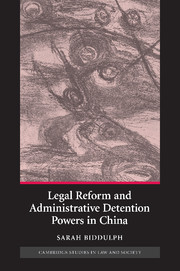Book contents
- Frontmatter
- Contents
- Preface
- Abbreviations
- Part 1 Introduction and conceptual framework
- Part 2 Social order and administrative detention
- 3 Historical antecedents: the 1950s and administrative detention
- 4 Social order, the ‘Hard Strike’ and administrative detention powers
- 5 Revival of administrative detention in the reform era: prostitutes and drug addicts
- 6 Re-education through Labour
- Part 3 Legal reform and its impact on administrative detention
- Part 4 Analysis and conclusion
- Appendix 1 Index of Legislation, administrative regulations, rules, normative documents, Party documents, speeches and cases
- Bibliography
- Index
6 - Re-education through Labour
Published online by Cambridge University Press: 27 July 2009
- Frontmatter
- Contents
- Preface
- Abbreviations
- Part 1 Introduction and conceptual framework
- Part 2 Social order and administrative detention
- 3 Historical antecedents: the 1950s and administrative detention
- 4 Social order, the ‘Hard Strike’ and administrative detention powers
- 5 Revival of administrative detention in the reform era: prostitutes and drug addicts
- 6 Re-education through Labour
- Part 3 Legal reform and its impact on administrative detention
- Part 4 Analysis and conclusion
- Appendix 1 Index of Legislation, administrative regulations, rules, normative documents, Party documents, speeches and cases
- Bibliography
- Index
Summary
INTRODUCTION
In this chapter, I trace the changing uses of RETL since the late 1970s and the policy context in which these changes have taken place. Controversy has dogged the power almost since its inception in 1955. Since then, one report asserts that over 3 million people have been sent to RETL.
I examine the ways in which the political and administrative modes of governance that predominated in the pre-reform era have continued to influence the development of RETL since 1978. In particular, I identify the use of RETL as a flexible tool to address changing social order problems in a way that is analogous to its use as an adjunct to political campaigns in the pre-reform era. I explore the proposition that, to date, there has been a high degree of continuity from the pre-reform era in the modes of governance and uses of the power, but that the objectives of RETL and the policy contexts in which it is used have changed. Originally RETL was implemented to consolidate state power by targeting opponents of the Party and government and other ‘bad’ people in order to educate and reform them. In the reform era, the focus of RETL has shifted toward targeting socially disruptive behaviour and minor criminal offences for the purpose of preserving social order and maintaining political control.
- Type
- Chapter
- Information
- Legal Reform and Administrative Detention Powers in China , pp. 193 - 220Publisher: Cambridge University PressPrint publication year: 2007



